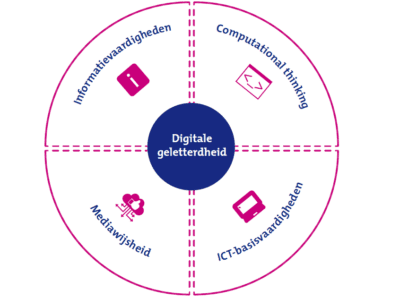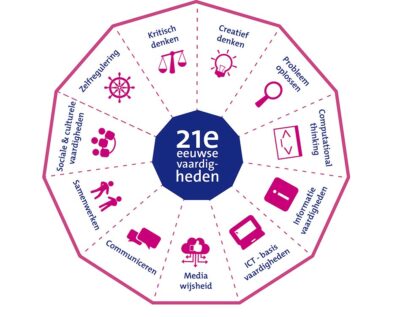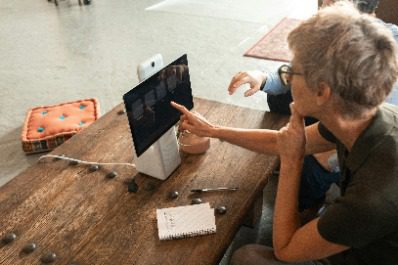What is digital literacy in education?
We live in a society that highly digitised is. Many important services are digital, which is why it is important for students in education to learn about them. Digital literacy is about all the skills and knowledge you need for this. For example, doing your banking, ordering groceries and applying for documents.
Pupils today not only have to just learn to read and write. They must also learn safe, effective, critical and aware using the digital applications that are currently available. They also need to prepare themselves for the digital future: at school, in further education, at work, as consumers, as citizens vis-à-vis the government and as citizens among themselves.
The 4 domains of digital literacy
 To break down digital literacy, digital literacy consists of 4 different domains. So these 4 together make up digital literacy, where we, Digital Creativity, teach students knowledge. The 4 different domains are:
To break down digital literacy, digital literacy consists of 4 different domains. So these 4 together make up digital literacy, where we, Digital Creativity, teach students knowledge. The 4 different domains are:
- ICT basic skills
- Information skills
- Media literacy
- Computational thinking
Want to know more about our method and working method, how we keep all our knowledge up to date and how we connect with the educational goals have? Then download our brochure! As a bonus, you will also receive an overview of all our workshops.
Download our brochure for free
ICT Basic Skills
Basic ICT skills refer to the knowledge and skills needed to understand the operation of computers and networks, to be able to handle different types of technologies, and to understand the operation, capabilities and limitations of technology. The term computer is used broadly here. It includes not only the personal computer, desktop or tablet but any technology in which a microprocessor has been used. Thus, basic ICT skills are suddenly a lot broader than just a real computer. Want to know more about how we impart basic ICT skills to students? Take a no-obligation call now contact on.
Information skills
Information skills are the competences that enable pupils to critically search, find, evaluate and process information from sources. This concerns both paper and digital information, such as fake news. It has become increasingly difficult to select reliable information from the overwhelming information available to students. Therefore, it is important to teach pupils to select the right information that is important.
Download our brochure on digital literacy for free
Creativity and technology play an important role in modern education, helping to develop skills essential for the 21st century. Read more in our brochure:
- Our method and approach
- How we keep our knowledge up to date
- Our alignment with educational goals of digital literacy
- As a bonus, you will also receive an overview of all our media literacy and digital literacy workshops
Download our brochure for free
Computational thinking
Students often know very well what a computer is, but actually knowing how a computer thinks and how to solve problems with a computer is a different story. This involves skills that are not easy to learn, but which are important for the future. These skills are summarised under the term Computational thinking. In everyday life, you come across them everywhere; in your smartphone, camera or tablet.
Media literacy
Media literacy is conscious and active participation in the media society. For pupils, learning to use all available media safely and intelligently is important for self-development. To participate well, several competences are needed. The Mediawijzer.net network has developed a competence model with the following competences:
https://netwerkmediawijsheid.nl/kennis-tools/competentiemodel/
Digital literacy in your classroom? We are happy to help you with this.
Contact us without obligation!
Education and skills of the future
Nobody knows what the future of education will look like. What is certain is that creativity and technology will play an important role in it. 21st-century skills are becoming increasingly important. Digital literacy, maker education and media education therefore play an increasingly important role. By working with new media, pupils acquire all kinds of skills such as: cooperation, communication, learning to work with ICT, critical thinking, creative thinking, problem solving, media literacy, etc. These are skills that will benefit children throughout their lives. The 21st-century skills are:
- Creative thinking
- Critical thinking
- Troubleshooting
- Computational thinking
- Media literacy
- ICT basic skills
- Information skills
- Communicate
- Collaborate
- Social & cultural skills
- Self-regulation

How Digital Creativity contributes to digital literacy
Digital literacy is thus very important for every child's development. By working on a creative way with this, we make learning a lot more engaging. As a result, students learn more from our lessons, which are perfect for all aspects of digital literacy. Learning always works better when you actually enjoy it. Any questions? Feel free to get in touch!
